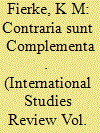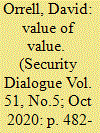|
|
|
Sort Order |
|
|
|
Items / Page
|
|
|
|
|
|
|
| Srl | Item |
| 1 |
ID:
164456


|
|
|
|
|
| Summary/Abstract |
The physicist Niels Bohr identified a parallel between quantum physics and Daoism and Buddhism. This parallel maps onto two debates regarding global IR, on the one hand, and the implications of quantum physics for the social sciences, on the other, highlighting the potential for a conversation between them. The quantum arguments unsettle the hierarchy between “positivists” and “reflectivists,” raising a question of which science, while Daoism and Buddhism, as traditions that have for millennia explored questions of language, agency and ethics, provide a framework for beginning to think about the human and social implications of more recent discoveries in quantum physics. Starting with Bohr's concept of complementarity, the argument moves to an analysis of Karen Barad and Alexander Wendt's work on quantum physics and the social sciences and then explores Bohr's parallel to Daoism and Buddhism. The structuring of the article around a series of oppositions, including particle/wave, ontology/epistemology, materiality/consciousness, egoism/relationality, and East/West highlights the relationship between global entanglement and the constitution of difference with it.
|
|
|
|
|
|
|
|
|
|
|
|
|
|
|
|
| 2 |
ID:
175132


|
|
|
|
|
| Summary/Abstract |
Money objects, from coins to bitcoins, are used in economic exchange as a way of putting a number on the fuzzy concept of worth or value. They are inherently dualistic in that they combine the properties of abstract numbers with the properties of owned objects. As a result of this duality at its core, the money system exhibits the properties of a macroscopic quantum system, including entanglement, indeterminacy and interference, with money objects playing a special role as a measurement device. This article argues that, by virtue of its dualistic nature, money acts as a vector of transmission that scales up the properties of quantum mind to the global level. By bringing money back into the picture and providing an alternative to the mechanistic vision of mainstream economics, quantum social science promises to change the way we see and treat the economy, with implications for international relations and security.
|
|
|
|
|
|
|
|
|
|
|
|
|
|
|
|
|
|
|
|
|